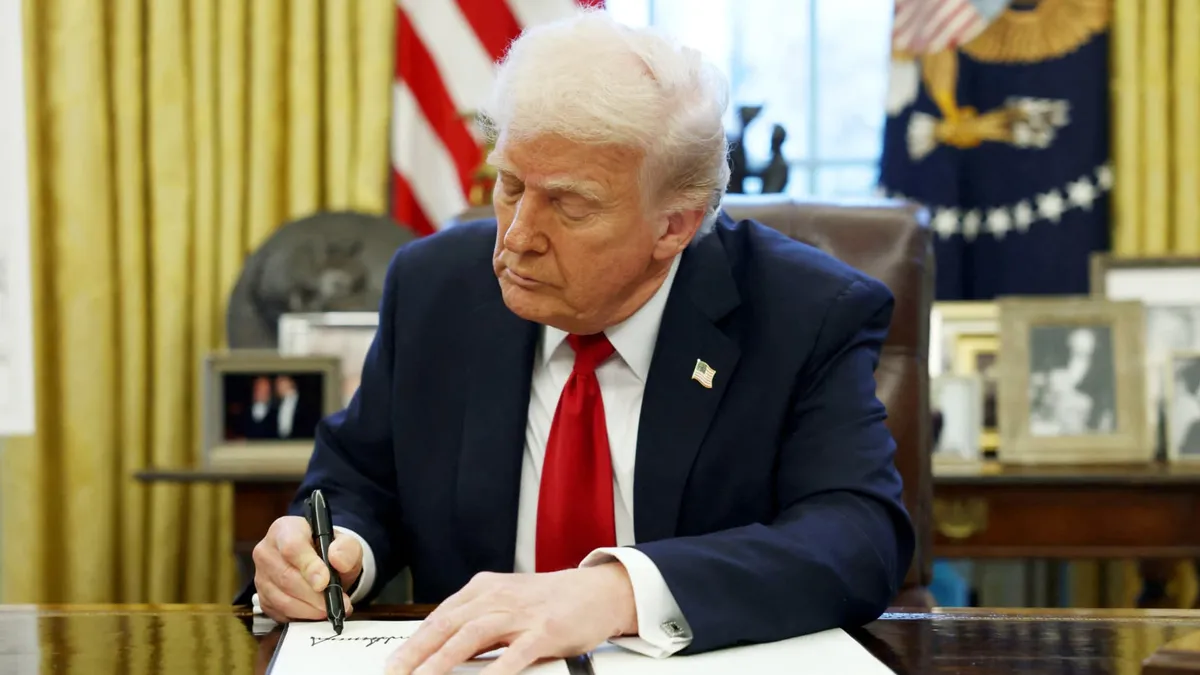
In a bold statement on Truth Social, U.S. President Donald Trump threatened to impose significantly larger tariffs on the European Union (EU) and Canada if they collaborate to undermine U.S. trade interests. Trump expressed, "If the European Union works with Canada in order to do economic harm to the USA, large scale Tariffs, far larger than currently planned, will be placed on them both to protect the best friend that each of those two countries has ever had!" This declaration signals an escalation in the ongoing trade tensions between the U.S. and its major trading partners.
On Wednesday, Trump announced a 25% tariff on all vehicles not manufactured in the United States, with these tariffs set to take effect on April 2. According to Will Scharf, a Trump White House aide, these new duties will apply to foreign-made cars and light trucks, and will be in addition to existing tariffs. Notably, the tariffs will also encompass crucial car parts, including engines, transmissions, and electrical components, many of which are imported to the U.S. and utilized in American automobile production. These parts tariffs are expected to come into effect in May.
Scharf estimated that these measures could generate over $100 billion in new annual revenue for the U.S. However, the announcement has already caused significant turmoil in global markets, as shares of U.S. and Asian automakers plummeted following the news. European auto manufacturers are also expected to see declines when markets open on Thursday.
Trump's administration has previously disrupted long-standing global trade relationships by imposing tariffs on goods from Mexico, Canada, and China, as well as levies on all steel and aluminum imports. He justifies these actions by citing unfair trade deficits with several of the U.S.'s largest trading partners.
The White House has stated that the latest tariffs aim to protect and bolster America's automotive industry. However, analysts have noted that U.S. car manufacturers rely on parts sourced globally, suggesting that these new tariffs could adversely affect them as well. As of now, the EU and Canada have not issued any official statements indicating plans to unite against the U.S. However, both have hinted at potential retaliation against the latest tariff measures. Ursula von der Leyen, President of the European Commission, emphasized that the EU would continue to pursue negotiated solutions while safeguarding its economic interests, stating, "Tariffs are taxes — bad for businesses, worse for consumers equally in the U.S. and the European Union."
Meanwhile, Canada’s new Prime Minister Mark Carney characterized Trump’s actions as a direct attack and announced plans for a high-level cabinet meeting to determine a response. "We will defend our workers, we will defend our companies, we will defend our country, and we will defend it together," Carney asserted in Kitchener, Ontario.
The latest tariffs pose significant challenges for Europe’s already struggling automobile sector, which has been facing intense competition and a need for innovation. The European Automobile Manufacturers' Association expressed deep concern over the announcement, highlighting that it arrives at a critical juncture for the industry amidst fierce international competition. Ludovic Subran, chief economist at Allianz, remarked that the targeting of European automakers was anticipated, given the political nature of the automotive sector.
Subran noted the immediate reactions in the stock markets and the automotive industry, emphasizing the uncertainty surrounding car consumption and registration, which have seen a decline this year. He suggested that the timing of these tariffs could exert significant pressure on the industry.
Trump's tariff policies have raised alarms among economists, who predict they could lead to inflation and increased prices for U.S. consumers, particularly in an already fragile economic climate. Analysts have expressed similar concerns regarding the new auto duties. According to analysts at Wedbush Securities, these initial tariffs could act as a significant headwind for both foreign and many U.S. automakers, potentially driving the average price of cars up by $5,000 to $10,000, depending on the make and model.
While the analysts believe these tariffs may evolve over time, the initial 25% tariff on foreign-made automobiles is seen as a substantial concern for U.S. consumers, creating uncertainty in the automotive market.
In conclusion, as the trade war escalates, the implications of Trump's tariff policies will continue to reverberate through the automotive industries in both the U.S. and abroad, raising questions about the future of international trade relations and economic stability.